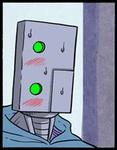|
FRINGE posted:
But enough about Obama taking away guns.
|
|
|
|

|
| # ? Apr 29, 2024 04:09 |
|
So has anyone heard anything about Harris v. Quinn? It seems like the court should obviously rule in favor of unions, but what are the chances of the conservative wing pulling out some tortured justification to destroy public sector unions?
|
|
|
|
|
VikingofRock posted:So has anyone heard anything about Harris v. Quinn? It seems like the court should obviously rule in favor of unions, but what are the chances of the conservative wing pulling out some tortured justification to destroy public sector unions? Wouldn't they just rule that you can't be required to pay for political activity, but you can be required to pay for bargaining activities (as is the case in non-Right to Work states)?
|
|
|
|
StarMagician posted:Wouldn't they just rule that you can't be required to pay for political activity, but you can be required to pay for bargaining activities (as is the case in non-Right to Work states)? The main complicating factor is that they aren't really employees of the state and therefore the requirements are more like political petitioning than like collectively bargaining. They get paid by the government via the medicaid program, but they aren't public employees by the usual definition and were actually ruled as NOT public employees by the Illinois Labor Relations Board. Or, at least, they weren't classified as public employees until an executive order was issued in 2003 saying they would be counted as such. Let's assume for a second that they aren't public employees (as was the case until the executive order). Forcing them to pay a group to petition the government on their behalf may be unconstitutional. Then, in 2003, the governor issues an executive order saying that personal assistants DO count as public employees for the purposes of labor relations, but for no other purposes at all. Suddenly a previously unconstitutional set of facts becomes constitutional simply by reclassifying personal assistants as public employees. If you accept that what they are forcing the personal assistants to do counts as collectively bargaining then it's pretty cut and dry. If you don't then it's at least an interesting case.
|
|
|
|
VikingofRock posted:So has anyone heard anything about Harris v. Quinn? It seems like the court should obviously rule in favor of unions, but what are the chances of the conservative wing pulling out some tortured justification to destroy public sector unions? If they were challenging their classification as public employees, it'd be an interesting case and the plaintiffs would have a decent shot since their current treatment is kind of bullshitty. Instead, though, they're challenging their situation on the grounds that all union dues everywhere violate their First Amendment rights, which I'm sure the Supreme Court will have plenty of fun pulling apart. There's no way that the facts of their case merit a broad ruling like the one they're asking for, and while in practice the Court can effectively do whatever it wants, it traditionally prefers to make narrow rulings.
|
|
|
|
From SCOTUS Blog, looks like the oral arguments didn't go great for the pro-union side.scotusblog posted:In the end, it may not happen, but the demise of public employee unionism was at least on the table for lively discussion in a Supreme Court argument Tuesday morning. The case of Harris v. Quinn would only spell doom for government workers’ collective action, it appeared, if Justice Antonin Scalia could be persuaded to join in doing it in; there just might be enough other votes. http://www.scotusblog.com/2014/01/a...28SCOTUSblog%29
|
|
|
|
Sorry for not understanding, but is the major debate of this case whether or not people can be legally compelled to pay union dues? So if this case finds that such mandatory dues are unconstitutional, it simply allows people to opt out of union dues while keeping their job? I also take it that the mandatory union dues were written into all default new hire contracts in some round of negotiations between labor and management, and now may be stripped out without renegotiation? I can see the SC easily ruling that mandatory dues are unconstitutional, because America was founded on the freedom to be a free-rider, loving over others (and yourself) for perceived personal gain.
|
|
|
|
Stereotype posted:Sorry for not understanding, but is the major debate of this case whether or not people can be legally compelled to pay union dues? So if this case finds that such mandatory dues are unconstitutional, it simply allows people to opt out of union dues while keeping their job? I also take it that the mandatory union dues were written into all default new hire contracts in some round of negotiations between labor and management, and now may be stripped out without renegotiation? It's about mandatory union dues in the public sector only, and potentially only for a subset of public sector workers.
|
|
|
|
Sad Banana posted:From SCOTUS Blog, looks like the oral arguments didn't go great for the pro-union side. Oh god. It doesn't really seem that arguments went badly so much as that several judges think public sector unions are inherently unconstitutional and intended to use this case to legislate from the bench regardless of what happened during arguments. I feel sick just from reading that post. To summarize, the current court rulings that allow public sector unions to collect dues from people who hold public sector jobs but don't want to be part of the union have a significant caveat. The dues collected from those non-members may be used for expenses related to collective bargaining, but not for ideological or political purposes such as lobbying for the passage of pro-labor laws. The plaintiffs' lawyer, paid for by the National Right to Work Legal Foundation, is arguing that because public sector workers work for the government, everything they do - including normal collective bargaining - has public policy implications. He argues that in the public-sector, right-to-work is constitutionally required because anything else would be political coercion. quote:Messenger essentially was trying to make the point that anything a public employee union does is an attempt to shape matters of “public concern,” and it should not be able to compel support — even for part of the monthly dues — from workers who oppose the union’s public policy ambitions. So far, it's split along ideological lines, with the liberal wing of the court (plus Scalia) calling that complete bullshit, and the conservative wing (except for Scalia) claiming that the activities and goals of a public sector union necessarily require increasing the size of the government or making it spend more money, which Kennedy characterizes as a "fundamental issue of political belief" and implies that public union dues amount to political coercion by forcing people that are against government spending to support unions which want to increase government spending. I wouldn't go so far as saying that Scalia's the swing vote, though; he's not buying the plaintiff's argument but I'm sure he'll find some other justification for being a shithead. Roberts seems to want to make a narrow ruling, so maybe we can expect him to save unions? Either way, though, it looks grim - the entire court, except maybe for Roberts, looks to be dead-set on deciding the fate of all public unions with this case, even though they could easily have avoided that issue if they wanted.
|
|
|
|
Okay so I don't really want to live in a world where loving Scalia saves the day, can someone explain what's up with him here?
|
|
|
|
Beamed posted:Okay so I don't really want to live in a world where loving Scalia saves the day, can someone explain what's up with him here? Scalia gets to assign the opinion if he makes that the majority. Wanna see a Scalia opinion that says the right thing with just enough dicta that set a bad example for future cases? 
|
|
|
|
Beamed posted:Okay so I don't really want to live in a world where loving Scalia saves the day, can someone explain what's up with him here? The transcript of the arguments is up, and based on a quick skim-over of what Scalia said, I think it confirms my suspicion that all the "JUSTICE SCALIA LAST HOPE FOR PUBLIC UNIONS" headlines are exaggerated. He didn't express immediate support for the plaintiff's arguments the way Alito did, but he didn't show any favor to the government's side either. He basically just spent the entire thing nitpicking minor details of everyone's arguments while carefully going out of his way to avoid showing support for either side. Sure, Scalia busted up the plaintiff's lawyer a few different ways, and seemed bothered by the larger implications of the plaintiffs' argument, but the government lawyer got slammed by a Scalia-Alito tag team accusing the union of paying off politicians in return for political kickbacks and darkly suggesting that it should have an effect on the outcome of the case. I don't think Scalia said a single nice thing to anyone there; the closest he got to showing favor to either side was when he suggested that the plaintiffs' case could possibly be brought into an arguable state if they dropped certain irrelevant aspects of their arguments.
|
|
|
|
esquilax posted:It's about mandatory union dues in the public sector only, and potentially only for a subset of public sector workers. The key to encourage people to pay union dues is for the union to offer benefits in exchange, I don't think anyone should be forced to pay union dues. I'm surprised that medical personnel in the US don't have powerful unions. In Denmark the nurses union is very powerful and can cripple hospitals with strikes or just the threat of strikes. One key aspect of unions in Scandinavian countries is that they offer unemployment benefits. If a nurse is fired he or she will receive 90% of her normal pay for up to three years until they find a new job. This is because it's advantageous to preserve their skill set in their sector, and it works because people with advanced skills generally want to work and will find new employment as soon as they can.
|
|
|
|
The whole, "They say you don't need a Union is your collar isn't blue/Well that is just another lie your boss is telling you!" thing never really took off in the US.
|
|
|
|
Demiurge4 posted:The key to encourage people to pay union dues is for the union to offer benefits in exchange, I don't think anyone should be forced to pay union dues. I'm surprised that medical personnel in the US don't have powerful unions. In Denmark the nurses union is very powerful and can cripple hospitals with strikes or just the threat of strikes. One key aspect of unions in Scandinavian countries is that they offer unemployment benefits. If a nurse is fired he or she will receive 90% of her normal pay for up to three years until they find a new job. This is because it's advantageous to preserve their skill set in their sector, and it works because people with advanced skills generally want to work and will find new employment as soon as they can. The public-sector unions in question are legally mandated to collectively negotiate on behalf of all employees in the given position, whether they're union members or not. This provides a "free ride" problem where someone who doesn't pay union dues gets just as much benefit from the union as people who do pay union dues...in which case, there's no incentive on an individual level to pay dues, since anyone can opt out of paying dues and still be on the same level as those who do pay dues. Since the individual worker doesn't see any immediate downside to not paying dues, they opt out. And when working conditions deteriorate (because everyone else opted out of dues too, yet the union still has to cover all of them), everyone just nods sagely and says "see how lovely the union is? Glad I wasn't wasting my money on that poo poo". Unions in the US are much weaker than Scandinavian unions for legal, cultural, and historical reasons, to the point where it isn't even comparable. Also, on an unrelated note, trawling through these transcripts is really depressing. Alito and Kennedy are being huge assholes about this, though I guess it's hard not to come off looking like a huge jerk when your position necessarily assumes the existence of employees that are ideologically opposed to getting better pay and working conditions for themselves because BIG GOVERNMENT. quote:JUSTICE ALITO: Well, let me ask you a question about pensions. Now, that's a very big public policy issue. I think in Illinois, the legislature recently cut pensions of -- of public employees. That would be a subject -- that could be a subject of -- of collective bargaining, right? So that would be - bargaining on that would be chargeable?
|
|
|
|
Main Paineframe posted:The public-sector unions in question are legally mandated to collectively negotiate on behalf of all employees in the given position, whether they're union members or not. This provides a "free ride" problem where someone who doesn't pay union dues gets just as much benefit from the union as people who do pay union dues...in which case, there's no incentive on an individual level to pay dues, since anyone can opt out of paying dues and still be on the same level as those who do pay dues. Since the individual worker doesn't see any immediate downside to not paying dues, they opt out. And when working conditions deteriorate (because everyone else opted out of dues too, yet the union still has to cover all of them), everyone just nods sagely and says "see how lovely the union is? Glad I wasn't wasting my money on that poo poo". Unions in the US are much weaker than Scandinavian unions for legal, cultural, and historical reasons, to the point where it isn't even comparable. Yeah that's an issue here as well. A few years back union membership was mandatory in certain workplaces, they removed that which caused some unions to band together and negotiate together, but negotiated benefits go to everyone, even those without a union. The rise of "yellow" unions is the biggest threat here, they offer the only thing that young people really want, which is the unemployment benefit, they label themselves as soft negotiators who want to use "dialogue" over force, which of course neuters their negotiating power. Red unionists hate them with a passion because they are indeed riding free on decades of hard battles and negotiations by the old unions. Culturally unions are still strong though, again because of the benefits. Perhaps we need a thread for this, because I'd love to explore union history in the US and what could be done to strengthen them again in certain sectors. Americans could really use a strong teachers union, perhaps a wealthy philantropist could be convinced to fund the establishment of one?
|
|
|
|
Demiurge4 posted:Culturally unions are still strong though, again because of the benefits. Perhaps we need a thread for this, because I'd love to explore union history in the US and what could be done to strengthen them again in certain sectors. Americans could really use a strong teachers union, perhaps a wealthy philantropist could be convinced to fund the establishment of one? They made a movie about that: Lex Luther's "Waiting for Superman"
|
|
|
|
Demiurge4 posted:The key to encourage people to pay union dues is for the union to offer benefits in exchange, I don't think anyone should be forced to pay union dues. I'm surprised that medical personnel in the US don't have powerful unions. In Denmark the nurses union is very powerful and can cripple hospitals with strikes or just the threat of strikes. One key aspect of unions in Scandinavian countries is that they offer unemployment benefits. If a nurse is fired he or she will receive 90% of her normal pay for up to three years until they find a new job. This is because it's advantageous to preserve their skill set in their sector, and it works because people with advanced skills generally want to work and will find new employment as soon as they can. Nurses have decent unions in some states that go a ways toward protecting the nurse's safety and liability(usually very intertwined). They seem to have limited "bargaining" power, considering the few I know of have had almost no improvements in wages over the last half decade, but I'm sure it's a lot better than if no such union existed. The sad thing is a lot of the nurses disregard the headway unions have made towards shift-limiting, mandatory breaks, etc. that protect them from overloading and/or potentially harming patients because of a combination of sense of duty and general compassion for keeping the patient's health more of a priority than their own. I think a lot of people don't realize how much effort and knowledge is required for nurses in critical care scenarios and just think of them like candy stripers as if medicine hasn't evolved since WWII. Doctors are still necessary, but well qualified nurses are the reason that doctors can handle far more patient loads nowadays. I have more respect for good nurses and teachers than any other type of worker.
|
|
|
|
It doesn't hurt that both nursing and teaching are both female-dominated professions and therefore treated with less respect because of it.
|
|
|
|
I'm curious to hear people's impression of Navarette v. California. I know it's not in the record on this particular case, but with the context of NSA leaking information to domestic law enforcement the standard California seeks would seem to create a pretty big loop hole in the fourth amendment. Wouldn't their standard create a way for officers to scrub fruits of a tainted tree in a way? That is, conduct an illegal search surreptitiously and then "anonymously" inform a clean-team officer that a crime was being committed. Permitting such a practice seems more insidious in a situation where state secrets privilege makes discovery of the illegal search impossible.
|
|
|
|
KernelSlanders posted:I'm curious to hear people's impression of Navarette v. California. I know it's not in the record on this particular case, but with the context of NSA leaking information to domestic law enforcement the standard California seeks would seem to create a pretty big loop hole in the fourth amendment. Wouldn't their standard create a way for officers to scrub fruits of a tainted tree in a way? That is, conduct an illegal search surreptitiously and then "anonymously" inform a clean-team officer that a crime was being committed. Permitting such a practice seems more insidious in a situation where state secrets privilege makes discovery of the illegal search impossible. I'd be surprised if such a holding went much past BOLOs for drunk or reckless drivers, although trying to predict SCOTUS crim pro holdings based on argument is a fool's errand.
|
|
|
|
KernelSlanders posted:I'm curious to hear people's impression of Navarette v. California. I know it's not in the record on this particular case, but with the context of NSA leaking information to domestic law enforcement the standard California seeks would seem to create a pretty big loop hole in the fourth amendment. Wouldn't their standard create a way for officers to scrub fruits of a tainted tree in a way? That is, conduct an illegal search surreptitiously and then "anonymously" inform a clean-team officer that a crime was being committed. Permitting such a practice seems more insidious in a situation where state secrets privilege makes discovery of the illegal search impossible. Looking at the SCOTUS blog summary, California's argument seems stupid on its face. Officers are following a car. If it's driving recklessly, they can pull it over. So, tips only matter when officers are following a car that isn't driving recklessly. And the state's argument is that reckless driving is such a threat to public safety, that they need to be able to stop this speed-limit-obeying vehicle, lest is somehow start some kind of invisible recklessness.
|
|
|
|
Oracle posted:It doesn't hurt that both nursing and teaching are both female-dominated professions and therefore treated with less respect because of it. I am always amazed how US teachers don't have strong unions. The Ontario Teachers' Pension Fund is massive. New teachers make $45,709 to $55,404, rising to between $76,021 and $94,707 for a teacher with 10+ years service.
|
|
|
|
Rust Martialis posted:I am always amazed how US teachers don't have strong unions. The Ontario Teachers' Pension Fund is massive. New teachers make $45,709 to $55,404, rising to between $76,021 and $94,707 for a teacher with 10+ years service. They've been under siege for decades because FREEDOM and lazy teachers get the whoooooole summer off don't you know and this one time I heard this one kid got a bad grade when he didn't deserve it and the lousy union kept the teacher from being fired can you believe it?!
|
|
|
|
Captain_Maclaine posted:They've been under siege for decades because FREEDOM and lazy teachers get the whoooooole summer off don't you know and this one time I heard this one kid got a bad grade when he didn't deserve it and the lousy union kept the teacher from being fired can you believe it?! The teacher's unions in the U.S. have also done some pretty dumb things and taken positions that are likely contrary to their own interest. The all-teachers-are-equal mentality is probably chief among them. Attempting to portray themselves as acting in the interest of students during any discussion of education reform (while advocating only the status quo) also blew up in their face.
|
|
|
|
Also people get super pissed when they go on strike and parents don't get their free baby sitters. A high school teacher told me a story about back when their union was bargaining for more benefits or higher pay, instead of going on strike they simple clocked out exactly when they were supposed to. Parents got really mad their kids weren't getting effectively free tutoring after school and a lot of the clubs couldn't be supervised.
|
|
|
|
|
KernelSlanders posted:The teacher's unions in the U.S. have also done some pretty dumb things and taken positions that are likely contrary to their own interest. The all-teachers-are-equal mentality is probably chief among them. Attempting to portray themselves as acting in the interest of students during any discussion of education reform (while advocating only the status quo) also blew up in their face. Yeah, teachers and teachers' organizations end up being a lot like law enforcement: there are good ones and there are bad ones, which ones you encounter can have a profound impact on the course of your life. Likewise, with both the good ones don't merely refuse to confront bad ones so much as they actually circle the wagons and loudly exclaim that the profession is made up of saints who should both individually and collectively be bowed down to and thanked. Just that teachers didn't cloak their self-interest in "fear for your children!" nearly as effectively as police did. Then again, they didn't have the whole war on crime era to give them a boost.
|
|
|
|
Teachers typically aren't able to get away with literal murder as often.
|
|
|
|
|
Rust Martialis posted:I am always amazed how US teachers don't have strong unions. The Ontario Teachers' Pension Fund is massive. New teachers make $45,709 to $55,404, rising to between $76,021 and $94,707 for a teacher with 10+ years service.
|
|
|
|
Demiurge4 posted:Yeah that's an issue here as well. A few years back union membership was mandatory in certain workplaces, they removed that which caused some unions to band together and negotiate together, but negotiated benefits go to everyone, even those without a union. The rise of "yellow" unions is the biggest threat here, they offer the only thing that young people really want, which is the unemployment benefit, they label themselves as soft negotiators who want to use "dialogue" over force, which of course neuters their negotiating power. Red unionists hate them with a passion because they are indeed riding free on decades of hard battles and negotiations by the old unions. In Denmark, the unionization rate is 75% - that is, 75% of workers are union members. In the US, the unionization rate is roughly 11%, with roughly 35% of public-sector workers and 6% of private-sector workers being union members. Here in the US, unemployment benefits are handled by the government rather than by the unions, and while there isn't anything analogous to your "yellow" unions, young workers here don't get along well with unions, which they often consider to be an outdated artifact of past times and a stalwart protector of the old and lazy. Presumably this is because younger workers don't value the health benefits and pension as much, they loathe the pay scales that often require working there for a certain duration to get raises, and they think the labor abuses that unions fought against have been ended forever and therefore there's no longer any need for unions to protect them from employers. That perception is also helped by the fact that when unions lose fights, they tend to shift the damage forward as non-retroactive cuts to benefits and wages that will only affect future workers, which is sensible for the unions but tends to breed resentment among the newer workers who feel that they're being sold out to protect older workers. KernelSlanders posted:The teacher's unions in the U.S. have also done some pretty dumb things and taken positions that are likely contrary to their own interest. The all-teachers-are-equal mentality is probably chief among them. Attempting to portray themselves as acting in the interest of students during any discussion of education reform (while advocating only the status quo) also blew up in their face. The "all-teachers-are-equal mentality" is actually really loving important, because "we'll protect you from biased or unfair employment decisions and require the employer to back up their claims with facts and meet certain contractual requirements designed to protect you from persecution" loses a lot of its draw if you tack on "unless you've been accused of something bad or the school insists (without any proof) that you're ba". If unions abandoned their efforts to protect their members as soon as the employer went and complained to the media about all those bad teachers, why the gently caress would anyone pay dues to a union that's comfortable dropping its members like hot potatoes as soon as the employer applies a little pressure? More importantly, it protects minorities of every kind. Union payscales aren't perfect, but the more subjectivity you allow the employer to have in employment and wage decisions, the bigger the pay disparity between white males and everyone else becomes.
|
|
|
|
Teachers have the unfortunate handicap of being in an oddly holistic field where pinpointing what makes an educator effective is a mutable formulae of coincidence. They're being hobbled by the recent push for more accountability/review, because while we can more or less identify a poor educator, identifying what makes a good educator good is difficult. Back to the union issue a few posts back. I cannot believe the bald-faced greed/idiocy of the individual that was a mouthpiece on the NPR segment I heard yesterday. Essentially, throwing the union negotiation ability under the bus because then maybe it'll allow some extra $$$ for her child's care (it won't, because of the way that the funds are structured). poo poo's infuriating, because the minute the care-giver's pool of talent diminishes, she'll be crying and wailing.
|
|
|
|
Main Paineframe posted:The "all-teachers-are-equal mentality" is actually really loving important, because "we'll protect you from biased or unfair employment decisions and require the employer to back up their claims with facts and meet certain contractual requirements designed to protect you from persecution" loses a lot of its draw if you tack on "unless you've been accused of something bad or the school insists (without any proof) that you're ba". If unions abandoned their efforts to protect their members as soon as the employer went and complained to the media about all those bad teachers, why the gently caress would anyone pay dues to a union that's comfortable dropping its members like hot potatoes as soon as the employer applies a little pressure? More importantly, it protects minorities of every kind. Union payscales aren't perfect, but the more subjectivity you allow the employer to have in employment and wage decisions, the bigger the pay disparity between white males and everyone else becomes. I never said anything about dropping members, but opposing any sort of merit based pay or promotion on principle is exactly the sort of thing that you described one paragraph above as alienating younger workers. When a young teacher sees someone who doesn't really want to be there anymore coasting the last six years to retirement (on a defined benefit pension that the younger teacher knows she's never going to get) getting paid 50% more no matter how hard she works or how good a job she does, it's pretty easy to see why she might not find the NEA particularly attractive.
|
|
|
|
The idea of merit based pay for teachers is disgusting until all school districts are equally funded and poverty is eliminated.
|
|
|
|
KernelSlanders posted:I never said anything about dropping members, but opposing any sort of merit based pay or promotion on principle is exactly the sort of thing that you described one paragraph above as alienating younger workers. When a young teacher sees someone who doesn't really want to be there anymore coasting the last six years to retirement (on a defined benefit pension that the younger teacher knows she's never going to get) getting paid 50% more no matter how hard she works or how good a job she does, it's pretty easy to see why she might not find the NEA particularly attractive. The problem with "merit pay" is that without hard performance data and strict controls on its interpretation, what tends to happen is the employer evaluates all white males as doing "better" work than women and racial minorities, gives lovely evaluations to people they don't like in order to hold them back from getting raises while their favorite employees climb the ladder twice as fast as anyone else even if they do lovely work, and so on. And anyone who says that we know enough to evaluate teacher performance objectively relying solely on data is lying through their loving teeth. "Merit pay" sounds like paying people better for doing better work, but in reality it's usually just shorthand for "let the employer choose different payrates for everyone using whatever system they want or no system at all, no, don't be silly, of course they'll do it fairly!". It's enormously appealing to young fresh-out-of-school libertarianish types convinced that they're the hardest worker their boss has ever seen and if it weren't for those danged union-mandated pay/promotion schedules, they'd be able to impress their bosses so much that they'd be vice-principal within a week, but realistically, those predictions rarely bear fruit - instead, they're given a token raise and then milked to the loving bone by dangling that carrot of "merit pay" in front of their face and then using it as an excuse to cut everyone's pay for "not working hard enough".
|
|
|
|
Seniority is a pretty good substitute for merit pay. Don't even get started on merit pay linked in any way to student test scores. That's absurd. I suppose I could conceive of a teacher led commission assigning contract values based on teacher observation of teachers, but that would probably reck the unions and would not be much if any improvement over seniority.
|
|
|
|
Main Paineframe posted:And anyone who says that we know enough to evaluate teacher performance objectively relying solely on data is lying through their loving teeth. e: In case that seems pedantic, it's really annoying to see metrics get criticized as the justification for either using no metrics or using really lovely ones. I realize that merit pay as it actually gets proposed is mostly sugar-coating from politicians that want to scuttle the public education system entirely, but the idea that we don't know enough to develop objective standards that correlate well to educational outcomes when we have more data and more tools to analyze it than ever is ridiculous. Test scores being "meaningless" is the same flavor of bullshit. OneEightHundred fucked around with this message at 04:45 on Jan 23, 2014 |
|
|
|
I've always held that the biggest problem with standardized tests is the assumption that 100% of students give a single poo poo about it.
|
|
|
|
|
Javid posted:I've always held that the biggest problem with standardized tests is the assumption that 100% of students give a single poo poo about it. I've always assumed the biggest problem with standardized testing is that they're absurdly poorly designed and teach skills that often must be forgotten five minutes after the test is over so the students can be taught the actual way of doing things like writing.
|
|
|
|
OneEightHundred posted:Using seniority IS relying solely on data as an objective performance measurement, it's just using "years worked" as the sole data point. You don't have to be a pedant, everyone knows he meant student metrics as the data in question. As for the the notion that our analytical methods for measuring teacher performance are viable at the current time, I'd be interested to hear more about that position. It may or may not be true, but I'm wondering if there is anything in particular bringing you to that position or if it's just a gut feeling.
|
|
|
|

|
| # ? Apr 29, 2024 04:09 |
|
OneEightHundred posted:Using seniority IS relying solely on data as an objective performance measurement, it's just using "years worked" as the sole data point. Using metrics to justify compensation for anything except for simple repetitive tasks has been shown to not be effective, and in most cases counter productive, in almost every study done in the last 30 years.
|
|
|









































